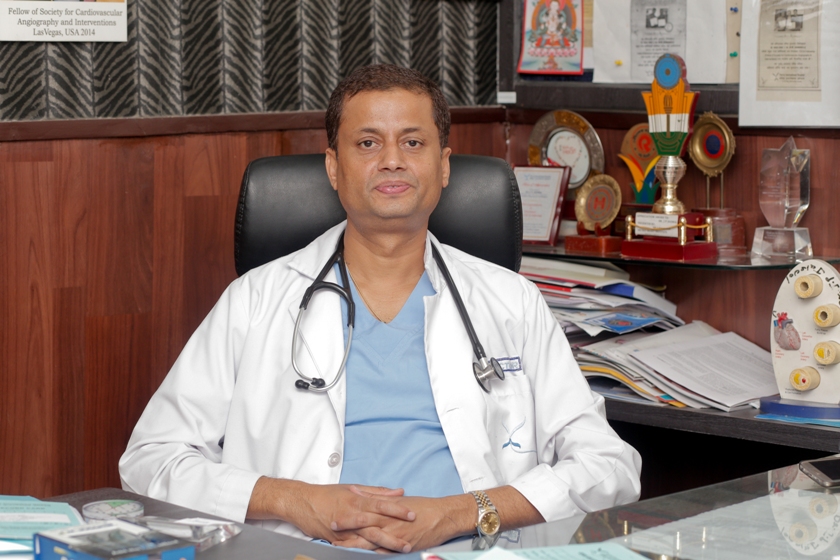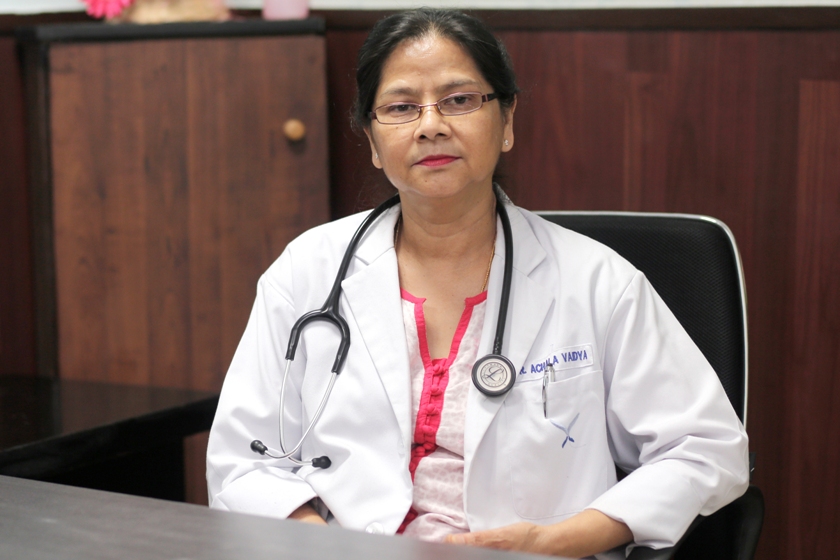
OR
The state of our health is largely dictated by where we live and how we live. Different cities report varying trends when it comes to health issues. Each year brings about new discoveries and cases so we set about to get a general health update in Kathmandu with Senior Consultant Cardiologist, Dr. J P Jaiswal and Chief Consultant Gynecologist, Prof. Dr. Achala Vaidya at Norvic International Hospital. They helped shed some light on the health concerns plaguing the capital dwellers of late and also discussed probable solutions to the problems.
What are the most common ailments among your patients these days?
The pattern is actually very clear. I could easily list the top five most common illnesses bringing people to the hospital these days. The first is hypertension. Majority of my patients are here because of this problem. Second we have diabetes, third Vitamin D deficiency, followed by hypothyroidism and lastly, Vitamin B12 deficiency. These cases are rampant these days.
Could you pinpoint the reasons behind majority of the people in the valley suffering from these illnesses?
The case does vary but, I believe, one of the main reasons that is causing all these health problems is the degrading quality of the food that we are consuming in the cities. There is so much pesticide and urea in the produce that is sold in our markets these days that we are bound to suffer from the consequences. It’s also the reason why we see a significant increase in the number of cancer patients. Further, the fact that most of us are prone to sedentary lifestyle and have easier access to high cholesterol/carbohydrate rich food (western junk food) is leading to many Nepalis being more vulnerable to a horde of diseases.

Dr. J P Jaiswal,
Senior Consultant Cardiologist
The trend of vitamin B12 deficiency, though, is a rather curious one. This ailment used to be mostly present among vegetarian elderly folks but now we are seeing these cases among non- vegetarians as well. Again, we suspect this comes down to the unhealthy means being used to raise poultry these days. We hear of instances where certain injections are given to chickens to fatten them up and its effects are being seen. The degrading quality of our food is really worrying. The way I see it, it is one of the biggest threats to good health.
So as a doctor how do you recommend we tackle this problem?
As a doctor, the only thing I can do is prescribe medication. However, we must remember that over dependence on medicine isn’t good for anybody. I believe this is where the government really needs to play its part. There should be a body in the government that strictly regulates the quality of the produce that is sold in the market. Also, we need to awaken the farmers’ conscience. Most of them adopt unethical means to make more profit but I wonder if they realize that by doing so they are affecting the health of their children and family as well. From what I see among my patients, I can tell you that this steady decline of the standard of food we are consuming really is an issue that needs to be urgently addressed.
Flu and food poisoning seem to be on the rise as well, what could be the reasons for this?
Again it circles back to our living conditions or rather the degrading quality of our living conditions. These days, air pollution is at an all time high. The never ending construction work has really aggravated the situation. And whenever monsoon comes around, I suspect the lack of proper sanitation and drainage systems causes a lot of health problems.
What about patients from out of the valley? Are the cases similar?
The cases that come to us from out of the valley are often chronic illnesses. What I see is that most out of valley patients come to Kathmandu as the last resort when their condition is really at the last stages. So, for example, there are many cases of kidney failures and hemorrhages. If we are to trace the patient’s history we also see that it is mostly because they weren’t taking the prescribed medicine. Even in cases where they have health centers in their area, we can see negligence and ignorance when it comes to matters of health. They tend not to treat the ailment in the early stages. I mostly see them only when the situation has become really bad and that is a shame. There is a need to raise more awareness about health care outside the valley.
Are there any gynecological cases that have become very common these days?
I have been practicing for 33 years and of late, I get a lot of cases of irregular menstrual cycles. The number of patients coming over with this complaint is more than ever at the moment. Often, if I see 20 patients in the morning, 10 of them cite irregular periods as their reason for the visit and most of them are youngsters between the ages of 18-26 years.
So what could be the reason behind this problem?
The reasons vary. It could be polycystic ovarian syndrome where hormone imbalance causes havoc in the system. There are cases where stress plays a big part. Many youngsters seem to be working and studying so that is a common reason too. However, a disturbing trend that I have noticed these days is random consumption of contraceptive pills. This is prevalent among both married and unmarried women.
Emergency contraceptive pills or abortion pills are easily available over the counter and you don’t even require a doctor’s prescription to purchase them. But this convenience is being abused by many. Teenagers today are becoming sexually active at an earlier age. We have 17 or 18 year olds who confess that they are active and mostly those who have irregular periods have been using these pills recklessly. In the married cases, it is also an issue of unwanted pregnancy. Again, there are many who self medicate leading to the same menstruation problem. They come and complain that they have missed their period for four months or more. These days it’s the most common issue I have
to treat.
Do you think this is because of lack of awareness among Nepali youngsters?
Ignorance does play a part, however that isn’t the only problem. Many people don’t want to discuss this problem beforehand. Even if some youngsters are engaging in sexual activities, it would be easier for us and them, if they came up to us for advice on precautions. This way they wouldn’t have to opt for these desperate measures. But many still feel uneasy to address these issues and that is putting their health at risk.
Are you satisfied with the level of awareness that Nepali women show about their reproductive health?
The number of regular screening and checkups has increased, if that is anything to go by. There certainly are more women who understand the importance of regularly visiting their gynecologists. However, we could definitely do with more awareness campaigns. For example, HPV is still foreign to majority of the women I treat. I still have to counsel about the importance of these injections in preventing cervical cancer. In comparison, those who have lived in India come and ask for it. I suspect it’s the effectiveness of their HPV campaigns that’s done the trick.

I’d highly recommend campaigns on basic care and hygiene as well. I encounter adults and kids alike who complain of rashes and infections and, in many cases, these could have been prevented if they were taught about the importance of maintaining daily hygiene routines. We also need to remind parents that this is information they must pass on to their children as well.
Prof. Dr. Achala Vaidya
Chief Consultant Gynecologist
You May Like This

State min: Right on reproductive health to protect women's reproductive right
KATHMANDU, April 10: Minister of State for Health and Education, Padma Kumari Aryal, has said that Act related to reproductive health... Read More...

Ministry of Health suspends 18 health workers for obstructing Polio vaccine program
KATHMANDU, March 5: Ministry of Health on Sunday suspended 18 health workers, including three district health office chiefs, on the... Read More...

State dinner hosted in honor of Mukherjee sans state dishes
KATHMANDU, Nov 3: President Bidya Devi Bhandari on Wednesday evening hosted a state dinner in honor of her Indian counterpart... Read More...





Just In
- Kushal Dixit selected for London Marathon
- Nepal faces Hong Kong today for ACC Emerging Teams Asia Cup
- 286 new industries registered in Nepal in first nine months of current FY, attracting Rs 165 billion investment
- UML's National Convention Representatives Council meeting today
- Gandaki Province CM assigns ministerial portfolios to Hari Bahadur Chuman and Deepak Manange
- 352 climbers obtain permits to ascend Mount Everest this season
- 16 candidates shortlisted for CEO position at Nepal Tourism Board
- WB to take financial management lead for proposed Upper Arun Project






_20220508065243.jpg)







Leave A Comment